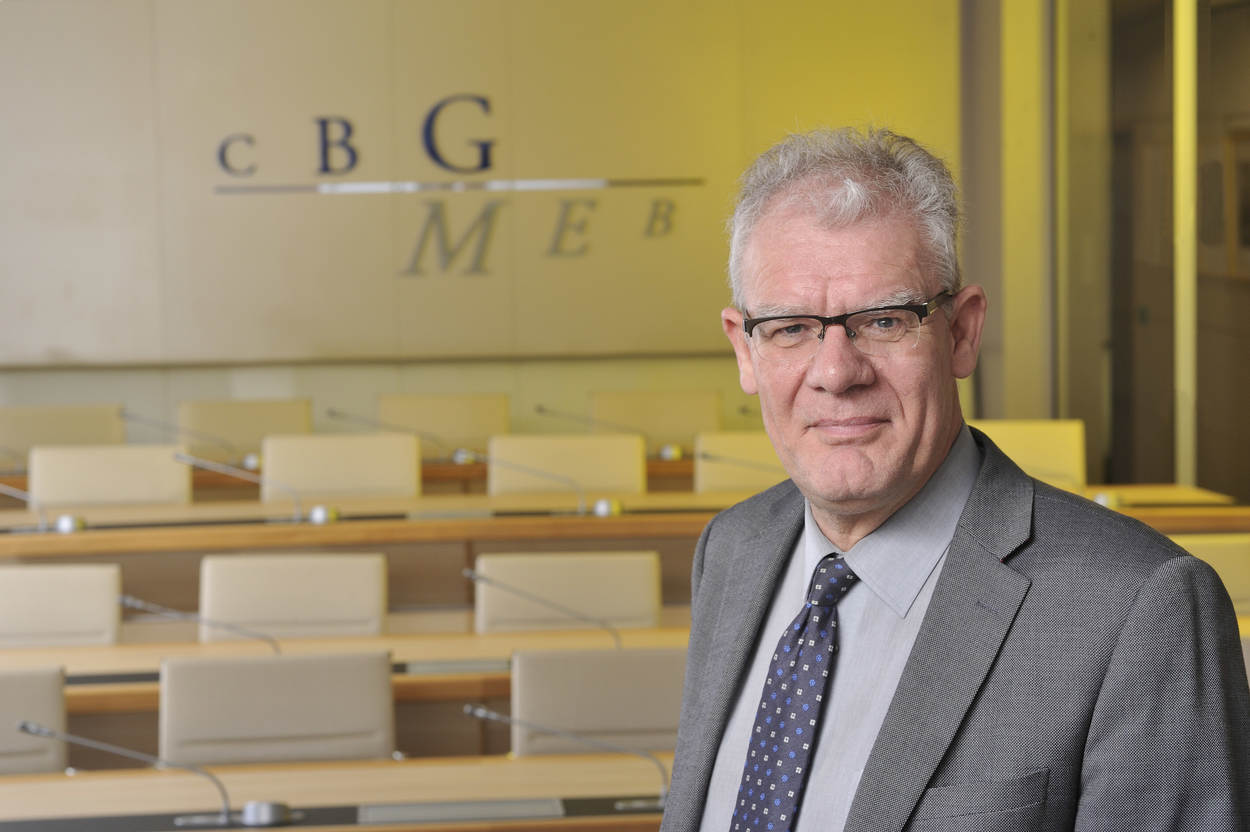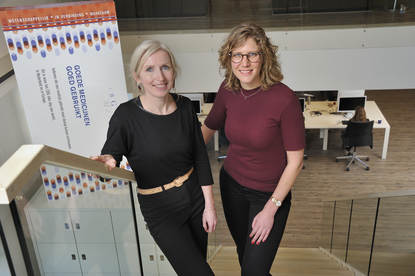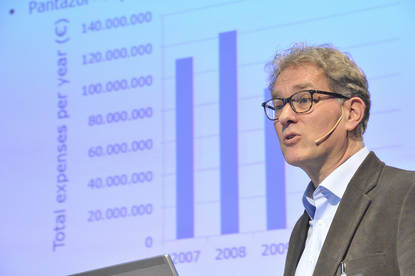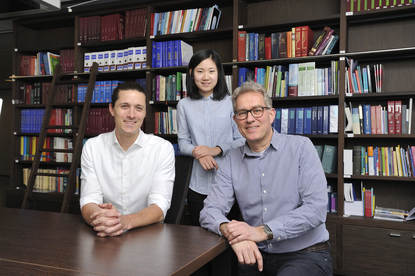Chairman of the Medicines Evaluation Board Ton de Boer did not see himself in this position beforehand. The new challenge came at the right time for the professor of pharmacotherapy at Utrecht University. De Boer began his work as chairman of the MEB in August 2017. With his fascination for molecules and the influence that they have on health, the MEB feels like home for him. De Boer will also continue his work at Utrecht University.
What has always fascinated me is: how do those medicines actually work?
“What has always fascinated me is: how do those medicines actually work? Therefore, after I finished my doctor's training, I became involved in clinical pharmacology research. I actually wanted to become an internist but that was difficult at that time. I was advised to go into research and I really liked it.
With medicines, you know exactly which molecule is concerned as opposed to, for example, food products. It is fascinating that we try and understand illnesses and diseases and try to influence these with medicines. I am very fascinated by molecules and how they can effect things. Ultimately, it all centres around health.
I regard it as an advantage that I am a doctor in a pharmacists’ world. Pharmacists often lack the clinical reasoning, whereas I do not have a molecular background. Ultimately, you produce medicines for patients; they need to benefit. Previously, pharmacists mostly received a chemical education with structural formulas, whereas now they are more co-practitioners. I also played a role in this myself. This medical background is necessary, because a pharmacist must be able to consult with a doctor, otherwise they are not able to do their work properly. I think that a great deal of progress has now been made in training and communication. However, there is still a field of tension: can pharmacists also be prescribers? The ultimate objective is to ensure that a patient can use his medicine safely.
Awareness of a field of tension
What I really like is that so many pharmacists work at the MEB. As a pharmacotherapy professor, my favourite field is drug knowledge; the science, the evaluation and assessment. This is complex and difficult. They do this at the MEB the whole day, and I am now part of this.
I feel right at home. There is a strong focus on the subject matter in the board meetings and that also appeals to me. I learn every day; the procedures, centralised, decentralised and national. What has to be discussed where, how is the agency organised? And there are constantly new developments, which takes some getting used to, as I like to be in control.
As chairman, you have to have a broad knowledge of medicines. It is about all types of diseases and medicines, which are becoming increasingly complex. I am rather outspoken about a number of topics in my other role at the university. That is a field of tension: I like to voice my opinion about homoeopathy or about the first choice for medication. That can be difficult. As a pharmacotherapy professor, I must be very outspoken. However, I have to be a bit more cautious now and be very aware of the MEB's statutory tasks, the Board's viewpoints and pursue a consistent policy.
“I already knew this position, the previous chairman was a direct colleague of mine. I knew he was stepping down, but had not thought of applying myself. After a meeting, I became interested. I thought it was an interesting field and there are also managerial aspects. This combination appealed to me.”
Medicine authorisation on other conditions
The policy that the MEB is pursuing is good and we must certainly continue on this course. I see a number of developments for the coming years, which we will have to deal with. For instance, authorising medicines on other conditions than regular authorisations. The FDA authorised a medicine in 2017 for various types of cancer at the same time and no longer for one disease. It doesn't matter whether it concerns breast cancer or prostate cancer; if it concerns a specific disorder in a cell, then you can use this medicine. Well now, this is a huge challenge as regards the benefit-risk balance. We are all used to having illnesses and diseases as the indication and not, as the FDA has done now, to have a medicine authorised on the basis of a biomarker. I would like to think along and be involved in these developments.
In 2017 we heard that the EMA is coming to the Netherlands. The MEB also worked hard to help make that possible. I think there are huge opportunities for the MEB to move forward as a national medicines authority together with the EMA. It really is a wonderful challenge. With many opportunities to come into contact with the outside world.
Like we agreed with the Dutch Heart Foundation to provide scientific advice, I see all kinds of possibilities to further develop existing contacts. For example with the National Health Care Institute, the CCMO, patient associations, and all kinds of stakeholders we have something to do with. To develop those contacts further, and creating a good relationship.
In 2018 I hope that the MEB will help to improve information on medicines aimed at patients. The package leaflet doesn't list the favourable effects. So the patient knows, when taking a medicine, what he can expect of it. At the MEB we have this information, but it's not on the package leaflet. I see that as a challenge.
One point of contact for questions about development, authorisation and compensation
At present, a manufacturer has to submit studies to various organisations and satisfy various protocols and guidelines in connection with the development, marketing authorisation and compensation of a new medicine. I would like this process to be more streamlined. That everyone still has their own responsibility, but that it is clear: who wants to know what where.
Based on my experience, I know that things are sometimes unclear. For instance, the Central Committee for Research Involving Human Subjects (CCMO) sometimes wonders why a manufacturer is carrying out a specific study. And then it turns out that this is required by the MEB. Or that the manufacturer discovers that the National Health Care Institute (ZiN) requires other studies for compensation decisions. I think that it is good to know more about each other. All parties that are involved in medicine development until the medicine becomes available for the patient, have now come together to share knowledge. You can take this a step further: that we have insight into each other's work and - as it were - issue a recommendation together. What I find to be an interesting discussion in this case is: at what point in time must society - the health insurers - start paying for the medicine? Up to what point should this be financed by the industry, up to what level of knowledge?
Include the beneficial effects of a medicine in the patient information leaflet
I think that we should be able to improve the information about medicines that is provided to patients. The patient information leaflet does not state what the beneficial effects of the medicine are for a patient. That is a missed opportunity. An ACE inhibitor states: your heart will pump better and your blood pressure will become lower. But it does not state: you will live longer and you are less likely to have a heart attack. These are all things that are known. This also applies, for that matter, to healthcare providers. You can find this type of information in the guidelines, but this information about the product is not stated in the Pharmacotherapy Compass.
The patient information leaflet can also be improved where side effects are concerned. Most, often older, patient information leaflets still contain all the medical occurrences that have ever been reported during the development of the medicine, but not all of these occurrences are proven side effects. For instance, occurrences are listed that occurred just as often among a placebo group. I would like to make a distinction between proven side effects and medical occurrences that were caused, for example, by the underlying disease. We still have a long way to go to realise this.
However, we already have a project running with the aim of providing more information to patients. We have to determine how we should proceed; which medicines should we do first and what do patients want to know. Because if you ask patients why they decide whether or not to take a medicine, then they say they want to know how it will benefit them and what the safety risks are. It is about their own personal decision, their own benefit-risk assessment. To be honest, this information is not readily available at present. Whereas, on the other hand, patients can find all sorts of information on the internet. And that is generally not well-balanced information.”
Ton de Boer
Ton de Boer obtained his Doctor of Medicine (MD) degree and followed a training programme in internal medicine for three years in various hospitals. He subsequently completed his PhD research project on a pharmacology topic at the Centre for Human Drug Research in Leiden and he worked in clinical epidemiology in the Leiden University Medical Centre. He then started working at the department of Pharmaceutical Sciences at the Utrecht Institute for Pharmaceutical Sciences (UIPS). De Boer has been a member of many committees and working groups, including the Central Committee for Research Involving Human Subjects (CCMO) and the National Health Care Institute (ZIN). He has always combined research and teaching. As from 1994, he fulfilled management tasks in the faculty board (head of the department until 2015). He became a professor of pharmacotherapy in 2001. He took a sabbatical and reduced his overloaded work week to two days a week working from home to take care of his sick wife. His wife died at the end of 2016.










